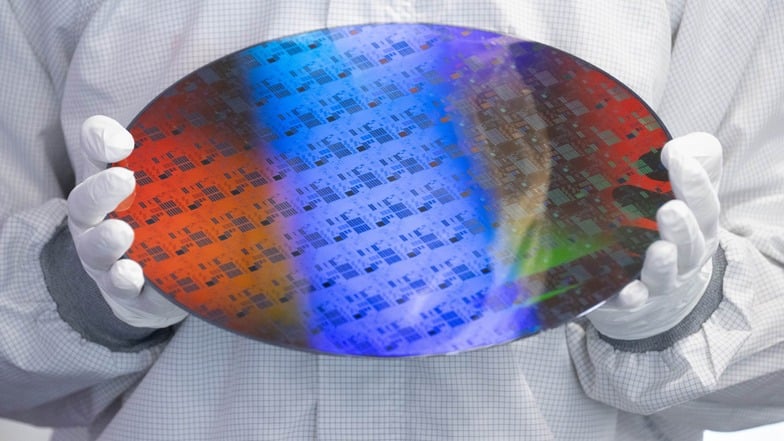For the German government's industrial policy, these were the coups of the year. With Intel in Magdeburg and TSMC in Dresden two of the biggest players in what is perhaps the world's most important future market are settling in Germany: the chip industry.
Berlin is willing to pay for this: Intel will receive 9.9 billion euros in government support for its 33 billion euro plant. TSMC receives half from the state for its investment of ten billion euros.
But for chip factories, it is not only the subsidy but perhaps even more the power supply that is the decisive location factor. Semiconductor production is very energy-intensive. It is therefore surprising that Germany, of all countries, with its internationally high energy prices, was able to convince chip manufacturers to locate here.
This contradiction can be resolved, among other things, by the fact that there are further agreements with the federal government - at least for some chip projects. This is shown by the answers provided by the Federal Ministry of Economics to parliamentary questions posed by Christian Leye and Alexander Ulrich, members of the Left Party, and obtained by Handelsblatt.
At Intel, there are several agreements at once. For example, the response from State Secretary for Economic Affairs Udo Philipp states: "With regard to securing the price of electricity in the future, it has been agreed that the German government will be available for talks with the company in the event of extraordinary price increases in order to seek solutions and examine support options."
Intel: Speech clause instead of subsidy automatism
Intel is aiming for a "stable, reliable electricity price for the future as well," he said. The company is currently in talks with several local energy suppliers. The aim is for the company to agree purchase guarantees to secure an average electricity price of ten cents per kilowatt hour for 20 years, according to government sources.
Behind the clause, however, there is no automatic mechanism for further state aid if the electricity price exceeds the threshold. This is precisely what Intel managers had demanded in the negotiations, according to negotiating circles. However, the Ministry of Economics and the Chancellor's Office had blocked this.
In addition to the subsidy of around ten billion euros, only a "speaking clause" has now been agreed. If electricity prices rise sharply, Intel can approach the federal government again and ask for further state aid. However, this does not mean that the government will agree.
In addition, the clause only applies if the increase in Intel's electricity price is due to reasons outside "the company's sphere of influence," such as another energy crisis.
Intel has promised to switch completely to green power by 2030. Last year, the share of green electricity was 93 percent, according to the company.
At the moment, Saxony-Anhalt still has more electricity from renewable energies than the state itself consumes, the state's Minister of Economics, Sven Schulze, told Handelsblatt. With the arrival of large companies such as Intel, however, this will change in the next few years.
TSMC: Electricity price less important
At TSMC, government support for electricity prices is significantly lower. For example, Secretary of Commerce Philipp writes: "Agreements between the federal government and the company, for example regarding an electricity price, have not been reached."
The reason for this is probably that Intel and TSMC are planning with completely different technologies. Intel will probably use the world's most modern and complex manufacturing process from the Dutch plant manufacturer ASML, High-NA EUV, in Magdeburg. The technology is particularly energy-intensive.
In addition: The consulting company BCG according to past experience, each significant technological leap also requires five to 15 percent more process steps. This means that more machines are needed and larger factories with larger cleanrooms. All this increases power consumption.
For Intel, the price of electricity is therefore much more important than for TSMC because of the complex production process. Thus, chips with structure sizes of less than two nanometers can be produced with High-NA EUV. The Taiwanese, on the other hand, initially want to produce chips with structure sizes of 22 and 28 nanometers as well as 12 and 16 nanometers in their new factory in Dresden.
But the electricity price issue could become more relevant for TSMC. Intel produces similarly small chips at other locations abroad, which is also conceivable for Dresden in the future.
Leye, a member of the Left Party, is therefore surprised that concessions have been made to Intel. He said the traffic light lacked a well thought-out, holistic chip strategy. "When it comes to promoting semiconductor projects, one company is subject to rules that are different again for the next company. This is where the traffic lights need to make significant improvements."
Chip companies could lose out on industrial electricity prices
Ultimately, Intel and TSMC must hope that electricity prices in Germany remain at least somewhat competitive. After all, the chances of them benefiting from a possible industrial electricity price are dwindling.
It is still uncertain whether it will be available at all. However, it is foreseeable that it will come, if at all, in a significantly narrower version. Federal Economics Minister Robert Habeck (Greens) originally wanted to include around 9,000 companies, explicitly including chip manufacturers.
The Economics Ministry had estimated the cost of the original concept at 25 to 30 billion euros. However, it is now unlikely that this sum will be raised, due to the limited financial options available to the federal government as a result of the debt brake. The Ministry of Economics therefore has various downsizing concepts on the table, including one aimed at 340 companies.
The chip manufacturers would then most likely be out. The good thing for Magdeburg and Dresden: Intel and TSMC have not tied their location commitments to the industrial electricity price.
This article first appeared in the Handelsblatt.








